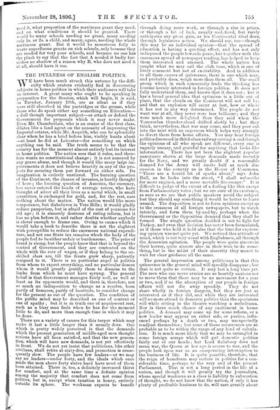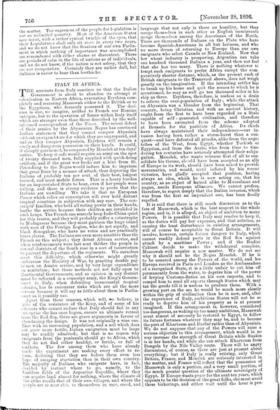THE DULLNESS OF ENGLISH POLITICS.
WE have been much struck this autumn by the diffi- culty which orators evidently find in discovering subjects in home politics in which their audiences will take an interest. A great many who ought to be speaking in preparation for the Session, which will begin, it is said, on Tuesday, January 19th, are as silent as if they were still absorbed in the partridges or the grouse, while those who do speak either say something on Education— a dull though important subject—or attack or defend the Government for proposals which it may never make. Even Mr. Chamberlain, who is an orator of the first class, dilates like a, land agent on the necessity of improving the Imperial estates, while Mr. Asquith, who can be splendidly clear when he has a brief before him, visibly hunts about —at least he did at Leicester—for something on which anything can be said. The truth seems to be that the country has for the moment almost entirely lost its interest in home politics. The nation sees that it rules, and there- fore wants no constitutional change ; it is not annoyed by any grave abuse, and though it would like many large im- provements it does not believe heartily in any of the pro- jects for securing them put forward on either side. Its imagination is entirely unstirred. The burning question of the Continent, the chance of invasion, is hardly thought of here ; the burning question of America, the currency, has never entered the heads of average voters, who have thought of silver all their lives as a metal which, in small quantities, is exchanged for gold, and, for the rest, care nothing about the matter. The nation would like more temperance, but disbelieves in Veto Bills ; it would gladly reduce pauperism, but is afraid of the cost of pensions for old age ; it is sincerely desirous of rating reform, but it has no plan before it, and rather doubts whether anybody is clever enough to frame one. Owing to causes which it would take a book to describe there is not the slightest wish perceptible to reduce the enormous national expendi- ture, and not one State tax remains which the body of the people feel to be either unfair or burdensome. The price of bread is rising, but the people know that that is beyond the control of Government, and they are contented on the whole with the rate of wages, or if they belong to the un- skilled class are, till the frosts grow sharp, patiently resigned to it. There is no particular angel in politics from whom to expect everything, and no particular demon whom it would greatly gratify them to dismiss to the limbo from which he must have sprung. The general belief is that Government manages fairly well, as well at least as its opponents would, and there is, therefore, not so much an indisposition to change as a resolve, born partly of firmness, partly of lassitude, to consider change for the present as out of the question. The condition of the public mind may be described as one of content or one of apathy ; but it is in truth one of acquiescent rest, such as a busy man feels when he has for the moment little to do, and more than enough time in which it may be done.
There are a variety of causes for this torpor which may make it last a little longer than it usually does. One which is pretty widely perceived is that the demands which the present generation of middle-aged men thought serious have all been satisfied, and that the new genera- tion, which will have new demands, is not yet effectively in front. We do not yet insist that politicians, like other civilians, shall retire at sixty-five, and promotion is conse- quently slow. The people have few leaders—or we may say no leaders—under forty, and the ideals which once made the men above forty strive hard have most of them been attained. There is, too, a definitely increased thirst for comfort, and at the same time a definite opinion among the majority that comfort does not come from politics, but is, except when taxation is heavy, entirely outside its sphere. The workman expects to benefit through doing more work, or through a rise in prices, or through a bit of luck, usually undefined, but rarely anticipates any great gain, as his Continental rival does, through legislative action. We should say, too—though this may be an individual opinion—that the spread of education is having a quieting effect, and has not only indisposed the people towards panic, but together with the enormous spread of newspaper reading, has helped to keep them interested and amused. The whole nation has caught what we may call the club tone, which is one of lively comment but not of excitability. And in addition to all these causes of quiescence, there is one which may, and probably does, weigh more than them all. The small group which in each community leads the thinking has become keenly interested in foreign politics. It does not fully understand them, and knows that it does not ; but it has a broad general idea that optimism is a little out of place, that the clouds on the Continent will not roll by, and that an explosion will occur at last, how or where it has not in any way determined. The people do not want war at all, they never were less bellicose; and they were much more delighted than they said when the Venezuelan thunder-cloud drifted slowly by ; but they think, nevertheless, that war may come, and they peer out into the mist with an eagerness which helps very strongly to divert them from home affairs. You may hear foreign politics discussed in third-class railway carriagE s, and though the opinions of all who speak are different, every one is vaguely uneasy, and grateful for anything that looks like information. There has not been the slightest popular annoyance shown at the large demands made recently for the Navy, and we greatly doubt if a reasonable demand for the Army will excite half as much dis- cussion in the country as in the House of Commons. "There are a horrid lot of sparks about," says John Bull, as he looks into the street, "I shall subscribe for more engines, and a more movable fire-escape." It is difficult t judge of the extent of a feeling like this except from Parliamentary votes ; but we are sure of its existence, as sure as we are that public speakers avoid the subject lest they should say something it would be better to leave unsaid. The disposition is not to form opinions except as to the crossness of all foreign newspapers, but to watch intently, and form them by-and-by, perhaps when the Government or the Opposition demand that they shall be formed The single question decided is not to fight for Turkey, and even that decision has never been formulated, as if those who held it held also that the time for express- ing opinion was not quite yet. We noticed this attitude of mind, which is not very usual with Englishmen, all through the Armenian agitation. The people were quite sincere in their horror, quite sincere also in their wish to do some- thing, but in the midst of their sincerity they meant to wait for clear guidance all the same.
The general impression among politicians is that this quiescence in the general mind will speedily disappear ; but that is not quite so certain. It may last a long time yet. The men who can move armies are so heartily anxious not to move them that there may be no movement for a year or two, and if so the absorption of our people in foreign affairs will not die away speedily. They do not share wholly in foreign dangers, but they are just as interested as if they did, and while they are interested will no more attend to domestic politics than the spectators will while sitting in the theatre watching a melodrama. Nor is there much chance of any excitement in home politics. A demand may come up for some reform, or a new leader may appear on either side, or parties, influ- enced perhaps by a death or two, may unexpectedly readjust themselves ; but none of those occurrences are so probable as to be within the range of any kind of calcula- tion. It is much more likely that we may be entangled in some foreign scrape which will put domestic politics fairly out of our heads ; but Lord Salisbury does not mean war, the Queen at her age is averse to war, and the people look upon war as an exasperating interruption to the business of life. It is quite possible, therefore, that the reign of humdrum may endure in politics for a con- siderable time, perhaps to the very end of the present Parliament. That is not a long period in the life of a nation, and though it will greatly try the journalists, whose special weakness as a class is liability to exhaustion of thought, we do not know that the nation, if only it has plenty of profitable business to do, will care greatly about the matter. Tne eagerness of the people for 1.-gislation is not an unlimited quantity. Most of the American States now insist, with a rather cynical twinkle of the eyes, that their Legislatures shall only sit once in every two years, and we do not know that the Sessions of our own Parlia- ment in which nothing of importance was accomplished are remembered with either shame or discontent. There are periods of calm in the life of nations as of individuals, and we do not know, if the nation is not asleep, that they are not recuperative. Certainly they are rather dull, but dullness is easier to bear than toothache.











































 Previous page
Previous page